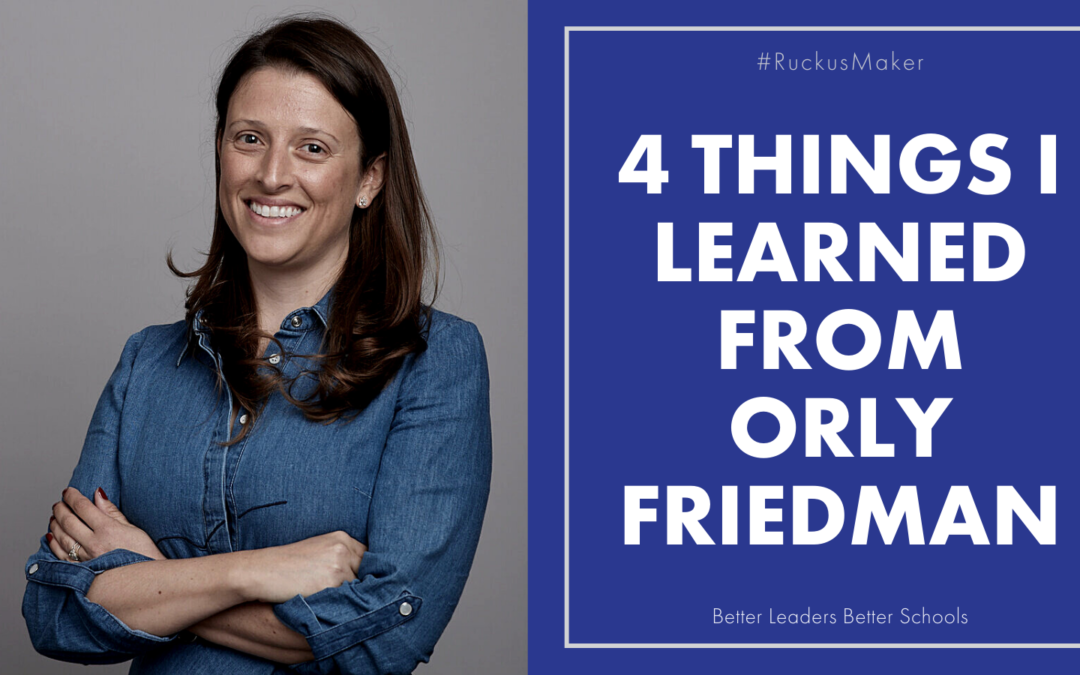Orly Friedman was Danny’s guest on a bonus podcast episode. She is the founder of the Red Bridge school in San Francisco. You can listen to our conversation, read the show notes, and get links to all the resources she mentioned here.
Below are 4 things I learned from Orly Friedman listening to this podcast.
Recognize and celebrate successes existing in your building.
One of Orly’s earliest successes was creating ways for non-athletes to earn letters. She was surrounded by bright, motivated students who didn’t see a tangible way to show some of their success, while their friends who were playing sports had lots of opportunities through the varsity lettering system.
Are there students in your building who have talents, skills, and accomplishments that are going unrecognized?
Think back to when you were a student. Were their achievements that you had that would have been made more momentous if there could have been some sort of recognition that came with it?
If you’re not sure, ask your students! By listening to the students and acting on their requests, Orly was able to add to the school culture while improving the agency her students felt. Over 20 years later, non-athlete students are still earning letters at this school.
That’s impact!
Youth voice matters. What are your students saying?
Find your Marigold (or your vegetable).
Orly’s career started in partnership with Sal Khan as a fellow educational ruckus maker. She found someone who had similar goals and aspirations for what a school could be and built an environment where students could thrive. This type of innovation and growth doesn’t happen when planted among weeds and surrounded by naysayers. It takes well-cultivated soil, shared vision, and dedication to the goals at hand.
When planting a vegetable garden, marigolds can be planted around the perimeter as a way to protect the vegetables from insects and diseases, while encouraging growth. If you are starting your leadership career, find your marigold – someone who will encourage you, protect you from those who want to get between you and success, and someone who you can bounce ideas off of. And if you’re more experienced, perhaps you are the marigold among a garden of growing vegetables. Will you plant yourself next to one?
Whether you see yourself as more of a marigold or a growing vegetable, the Better Leaders Better Schools Mastermind groups offer a garden space rich in nutrients, support, and accountability so that you can grow to your fullest potential.
What are you rewarding – compliance or mastery?
At Red Bridge, students decide what product they will submit for assessment, and when they will turn in that evidence. In order to do this, they must understand the objectives enough to know that what they are turning in is evidence of their mastery of that content. Teachers are available along the way to encourage the students, ask and answer questions, and help provide environments necessary for the student to work toward mastery.
Imagine how this could be transferred to teacher observations. What if your teachers had the autonomy to decide when they would invite you into their classroom to demonstrate mastery of their craft? What if you provided support along the way, asked and answered questions, and did all you could to provide the environment necessary for them to succeed?
If you are underwhelmed or annoyed with your current process of teacher observations, so are your teachers. Try something new. You hired professionals. How would the overall morale among your faculty change if you let them lead the way when it comes to showing their own mastery? How would discussions about teacher performance change if they were led by the teacher?
Time to get results!
We often ask our teachers to create goals at the beginning of the year, and then check-in at the end of the year to see how it went. While setting goals is a great practice, the knowledge we have before the school year starts about the students entering the building, what might happen over the course of the year (cue global pandemic), or what divisional leaders might ask from us, is likely insufficient for setting high quality, rigorous goals.
By redefining goals as objectives and key results (OKRs), we not only allow space to set targets for ourselves or our staff to hit, but also define what it’s going to take to get there. The best thing about OKRs is getting to break goals down into small chunks, which actually allows us to reflect on our progress along the way in a more tangible way. OKRs are also responsive to what is happening in the environment, and allow adjustments along the way for unforeseeable circumstances or shifts in priority that accompany any school year. You can see how Danny utilizes OKRs for BLBS by clicking here and looking for the monthly results posts. If you’re looking to level up productivity for yourself or your staff, consider OKRs. After all, they are a school leader’s productivity secret weapon!



